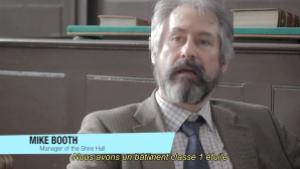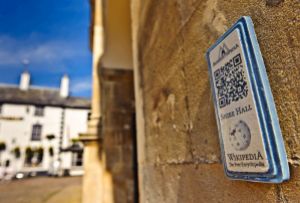
You’ve probably heard the saying, “In theory, Wikipedia shouldn’t work, but in practice it does.” Three of the things that contribute to make Wikipedia work are topic-specific WikiProjects (“let’s write about a town), Wikimedia chapters (“let’s organize throughout the United Kingdom”), and unique ideas (“let’s use QR codes to share content”). This week these three things successfully came together to create Monmouthpedia, “The World’s First Wikipedia Town” in Monmouth, Wales.
The idea for Monmouthpedia began at a TEDx talk in Bristol when John Cummings, an occasional Wikipedia editor, suggested from the audience that the UK Chapter use QR codes to “do a whole town.” That challenge was handed to Cummings when the Wikimedia UK chapter backed the idea. He then moved to his home town of Monmouth where he assembled an ad hoc group of supporters who wanted to participate, including the local County Council.

The project has taken six months of preparation, including a commitment by the town to install a free, town-wide wi-fi network (the first of its kind in Wales). On 19 May the entire town will be bedecked with banners declaring Monmouth as the first Wikipedia Town in the world.
The Monmouthpedia project uses QRpedia to allow visitors to scan QR codes that link directly to the Wikipedia article in their own language. Because of Monmouth’s efforts to provide free wi-fi and implement QRpedia, the town is likely the only place where a visitor can tour in Hungarian, Hindi, Indonesian, Welsh, or numerous other Wikipedia languages using QR codes.

Much of the success of Monmouthpedia comes from its ability to capture the imagination of the Wikipedia community, which has embraced the town virtually. Wikipedia volunteers have contributed nearly 500 new articles in over 25 languages, as well as videos on topics such as the historic Chartists movement.
The project also has a long list of partners, including 200 businesses, several universities and nearly every school and community group in the area. Wikipedia has partnered with museums and other institutions before, as in Derby, but in Monmouth you will see over 1,000 QR codes on every school, every important building, and hundreds of shops. The County Council itself has a QRpedia code in its reception that takes you to their Wikipedia article.
Lest you think this is a passing interest, the town of Monmouth is in it for the long haul. Many of the QRpedia codes are printed on ceramic plaques that should last for decades. The information in articles is backed by the Wikipedia community and will be continually improved and expanded. Physical guides and maps will become outdated, but the Wikipedia articles will always be able to be updated. This potential for on-site access to up-to-date information in any language is what makes the Monmouthpedia model so exciting.
How long can Wikipedia defy the theory and continue to deliver free information to the planet in over 280 languages? We think the Monmouthpedia story provides a very optimistic outlook.
If you want to find out more, visit the Monmouthpedia website and take a look at the associated articles on Wikipedia.
– Roger Bamkin, Director of Wikimedia UK (Victuallers)

Can you help us translate this article?
In order for this article to reach as many people as possible we would like your help. Can you translate this article to get the message out?
Start translation